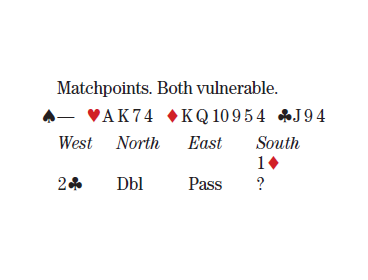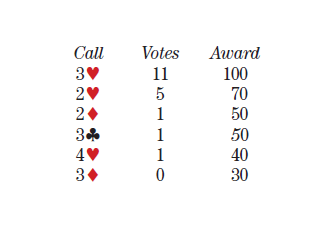
What’s your call?
| 2♦ | 2♥ | 2♠ | 2NT | |
| 3♣ | 3♦ | 3♥ | 3♠ | 3NT |
| 4♣ | 4♦ | 4♥ | 4♠ | 4NT |
| 5♣ | 5♦ | 5♥ | 5♠ | 5NT |
| 6♣ | 6♦ | 6♥ | 6♠ | 6NT |
| 7♣ | 7♦ | 7♥ | 7♠ | 7NT |
| Redbl | Pass |
Traffic jam on the low road
Opposite a partner who may or may not have four hearts, most of the experts take what they believe to be the low road.
Eleven low-roaders bid 3♥.
“This hand definitely has a lot of potential, but I don’t want to bid anymore,” says Meckstroth. “Partner could have the one-suiter in spades, in which case we are too high already.”
Weinstein describes 3♥ as showing “a distributional hand with some extra values. That’s what I have. It’s possible partner has a weak hand with just spades, but I’m really against making a negative double with just spades and a weak hand. I hope my partner is on the same page as me.”
“We are taking the low road and only inviting since we are playing matchpoints,” say the Sutherlins. “Spade values in partner’s hand are wasted values. If he doesn’t have extras, then 4♥ is probably a poor contract.”
The Coopers are prepared for partner’s expected 3♠ call. “We have tremendous playing strength in hearts. Partner, however, has not promised both majors. When he bids the expected 3♠, we will retreat to 4♦.”
“Would I be disappointed if the auction ends here?” asks Sanborn, who also bids 3♥. “I don’t think so. We are not even guaranteed an eight-card fit.”
Stack calls his cards “an excellent playing hand. I will bid 4♦ if partner advances with 3♠ or 4♣. There could easily be a slam and we will cooperate with any slam try.”
According to Boehm, “If North made a one-suit negative double with long spades, this may not fare well, but as long as North has hearts (or diamonds), game prospects are bright. Partner will know to promote club shortness and a fit.”
Cohen rates the hand as “worth more than 2♥. 3♥ is not a jump shift. It is like raising hearts.”
Slower low-roaders bid 2♥.
“It’s wise to take it slow in this particular auction,” says Walker, “as partner doesn’t have to have hearts. I’m not sure this hand is worth a jump anyway, as the spade void is likely to be a wasted value, and the club holding is a liability.”
The Joyces make the same call, phrased a little differently. “On the surface, 2♥ seems like an underbid, but it is worrisome that RHO didn’t raise clubs. Partner might have a significant portion of his resources in spades.”
“If I bid more hearts immediately, partner may expect a much better hand,” says Falk. “Also, partner may not have hearts. With:
♠K Q 10 x x x ♥Q x ♦J x x ♣x x,
North would make a negative double, planning to bid spades next. So I’ll start slowly and see what happens. I can bid aggressively later if I have not overstated my values at this turn.”
Kennedy also chooses 2♥. “It is possible that partner has spades, in which case I have an opportunity to bid 3♦.”
Robinson queries partner with a 3♣ cuebid. “I have to find out if partner has four hearts. If he doesn’t, then I’ll play in diamonds.”
Colchamiro out-lows all of the other low-roaders. “2♦. Partner is about to bid 2♠, so I go low. I’ll follow up with 2NT (two places to play) and correct 3♣ to 3♦ to bring hearts into the picture.”
Lawrence, on the other hand, takes the high road. “4♥. My partner won’t know what is working if I bid just 3♥, and bidding less is feeble. If he has some kind of spade hand, I will end up in 5♦.”

